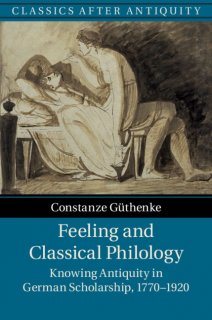Nineteenth-century German classical philology underpins many structures of the modern humanities. In this book, Constanze Güthenke shows how a language of love and a longing for closeness with a personified antiquity have lastingly shaped modern professional reading habits, notions of biography, and the self-image of scholars and teachers. She argues that a discourse of love was instrumental in expressing the challenges of specialisation and individual formation (Bildung), and in particular for the key importance of a Platonic scene of learning and instruction for imagining the modern scholar. The book is based on detailed readings of programmatic texts from, among others, Wolf, Schleiermacher, Boeckh, Thiersch, Dilthey, Wilamowitz and Nietzsche. It makes a case for revising established narratives, but also for finding new value in imagining distance and an absence of nostalgic longing for antiquity.
When asked about this and future projects Constanze said: “This book in a sense reflects my longstanding experience of moving across different academic disciplines in the Humanities (Classics, Comparative Literature, German Studies) as well as between different institutions and countries (The UK, Germany, Greece, and the US). In many ways, it is the result of turning my own, quotidian but often insistent questions — why did people say what they said in departmental meetings? what was shaping and animating the institutional cultures around me? what language did my colleagues use and how did they and I think of what “we” were doing? — into a historical research project about the often unspoken assumptions of interpretation in the field of Classics. Scholarship is personal and situated, and being clear about how we construct relations within the academy, with our objects of study and with each other, may hopefully make us more responsible and flexible in carrying out and also in changing and adapting our academic habits and practices, giving leverage for how to think of Classics in a more open way.
In future projects, I hope to take a new critical look at one of the interpretation practices closely linked to classical texts, namely to treat them as exemplary. I remain committed to studying how knowledge is always a result of relations, translations, and movement, and I am embarking on a larger project about forms of classical knowledge in the American academy, and the deep and complicated role of their interconnectedness with Europe.”
Find out more from Cambridge University Press here.
